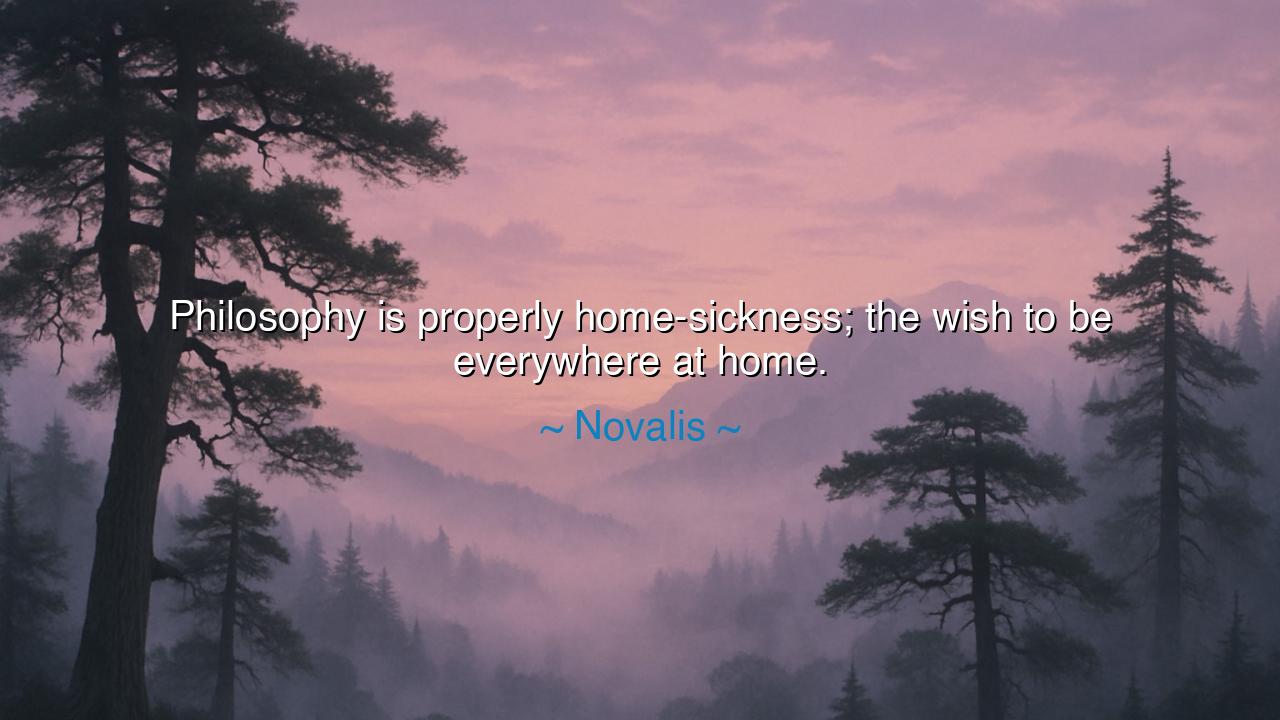
Philosophy is properly home-sickness; the wish to be everywhere






There are words that shimmer with the tenderness of longing, words that seem to bridge heaven and earth. So it was when the poet-philosopher Novalis wrote: “Philosophy is properly home-sickness; the wish to be everywhere at home.” In these few, luminous words, he revealed not merely a thought, but a human ache — the yearning of the spirit to belong to all that exists, to feel at ease in a world both wondrous and strange. To him, philosophy was not the cold reasoning of the mind, but the warm hunger of the soul seeking its lost dwelling — a home not made of stone or soil, but of understanding, unity, and divine presence.
Born in the twilight of the Romantic era, Novalis — whose true name was Georg Philipp Friedrich von Hardenberg — lived in an age when science had begun to replace faith, and reason had dethroned mystery. Yet, unlike many of his contemporaries, he did not despair. He saw in philosophy a sacred art — not merely the pursuit of knowledge, but the quest to feel at one with the universe once more. To him, to think was to return home, to rediscover one’s place amid the vastness of creation. This “home-sickness” was not a disease, but a holy longing — the soul’s remembrance that it once belonged to something infinite, and now seeks to find it again through thought, beauty, and love.
To call philosophy “home-sickness” is to understand that every question we ask — about life, death, good, and evil — arises from a deeper yearning: the desire to make sense of where we are and why we are here. The philosopher’s search is not so different from the wanderer’s — both long to find rest in a world that seems foreign. The mind may travel through systems and theories, but the heart behind those questions seeks the same peace that the exile seeks when he gazes toward his homeland. In this way, every true philosopher is a pilgrim — one who walks through thought as others walk through deserts, guided not by certainty but by longing.
This yearning for home has echoed through every age. The ancient Odysseus, after years of war and wandering, longed not for glory or conquest, but for the quiet familiarity of Ithaca — for the warmth of hearth and the embrace of Penelope. His journey was not only across seas but through the wilderness of his own soul, seeking that place where he could once again belong. So too does the philosopher wander through the vast ocean of being, striving to feel at home in the world of thought, to reconcile himself with mystery, to bring heaven and earth together in the heart’s understanding.
But Novalis teaches us that this home-sickness is not meant to be cured — for it is the very pulse of philosophy itself. The wise do not seek to escape their longing; they cherish it. For in the ache of exile lies the seed of wonder. If one were truly at home everywhere, one would cease to question, to marvel, to grow. It is our estrangement that drives us toward knowledge, our feeling of separation that draws us back toward unity. Thus, to feel homesick in the world is not a flaw but a blessing — a sign that one’s soul is still awake, still reaching for truth.
Consider also the mystic Plotinus, who said that the soul’s highest aim is to “return to the One,” the divine source from which all things spring. His entire philosophy was built upon this very home-sickness — the awareness that we live as exiles from the divine and that all thought, all contemplation, is a movement back toward that original light. Like Novalis, Plotinus understood that wisdom is not acquired through possession but through reunion — through remembering that we are fragments of something whole and eternal.
The lesson, then, is this: never silence the longing within you, for it is the compass of the spirit. When you feel out of place in the world, when you stand before life’s vastness and feel both awe and ache — know that this is philosophy awakening in you. Let your questions be prayers; let your confusion be curiosity. Seek to make every corner of existence your home — in the forest and the city, in solitude and in company, in art, in labor, and in love. The wise are not those who have conquered the world, but those who have learned to feel at home within it, even amid its strangeness.
So, as Novalis teaches, let philosophy be not a discipline of logic alone, but a journey of the heart — a homecoming of the soul. Do not flee from the feeling of exile; embrace it as the call of eternity echoing within you. For the one who continues to search, who dares to love the world despite its impermanence, will find, in time, what all wanderers find: that home is not a place but a state of understanding, and that to be “everywhere at home” is the destiny of every awakened soul.






AAdministratorAdministrator
Welcome, honored guests. Please leave a comment, we will respond soon